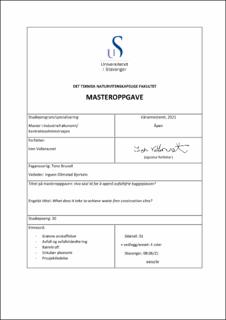| dc.contributor.advisor | Bruvoll, Tone | |
| dc.contributor.advisor | Bjerkelo, Ingunn Olimstad | |
| dc.contributor.author | Valleraunet, Iren | |
| dc.date.accessioned | 2021-09-22T16:26:24Z | |
| dc.date.available | 2021-09-22T16:26:24Z | |
| dc.date.issued | 2021 | |
| dc.identifier | no.uis:inspera:78874059:48532514 | |
| dc.identifier.uri | https://hdl.handle.net/11250/2780580 | |
| dc.description.abstract | Byggenæringen er den sektoren som genererer mest avfall i Norge, og selv om bransjen jobber mot
en avfallsreduksjon viser statistikk at mengden øker fra år til år. Potensialet for å ivareta
naturressursene er stort, og en omstilling av bransjen vil være nødvendig for å sikre et bærekraftig
samfunn for fremtidens generasjoner. En avfallsfri byggeplass har ikke vært gjennomført i praksis, og
bransjen er avhengig av at hele verdikjeden fra produsent til utbygger jobber sammen om dette som
et felles mål.
Hensikten med denne oppgaven er å kartlegge dagens kunnskapsnivå og attraktiviteten rundt
avfallsfrie byggeplasser. For å belyse problemstillingen: «Hva skal til for å oppnå avfallsfrie
byggeplasser?», er det utarbeidet tre forskerspørsmål:
• Hvilke ulikheter og likheter finnes i tankegang og praksis hos entreprenør, rådgiver og
byggherre for avfallsfrie byggeplasser?
• Hvordan vil avfallsfrie byggeplasser bidra til en sirkulærøkonomi og miljømessig gevinst?
• Hva skal til for å øke attraktiviteten rundt avfallsfrie byggeplasser?
For å besvare forskerspørsmålene er det gjennomført kvalitative dybdeintervjuer av representanter
fra bransjen. Byggenæringen består av flere ulike aktører og for å få et representativt svar er det
valgt intervjuobjekter fra både byggherresiden, entreprenørsiden og rådgiversiden. Det er også
gjennomført en kvantitativ spørreundersøkelse med formål om å måle temperaturen rundt temaet
for flere store og små entreprenørselskap i Norge.
Resultatene viser til en noe varierende definisjon av avfallsfrie byggeplasser, og kun halvparten av
representantene mente dette var mulig å oppnå i fremtiden. Prefabrikkering ble nevnt av alle
kandidatene i en eller annen sammenheng som bidragsyter til en avfallsfri byggeplass. Avfallsfrie
byggeplasser vil bidra positivt i omstillingen til en sirkulær økonomi, bedre ressursutnyttelse og en
bærekraftig utvikling av samfunnet. For å gjennomføre denne praksisen kreves det et kunnskaps og
kompetanseløft både digitalt og faglig. Det trekkes fram at nødvendig teknologi eksisterer og brukes i
andre bransjer, noe byggenæringen bør ta nytte og lærdom av.
Oppgaven konkluderer med at det først og fremst er prefabrikkering som vil bidra til å komme
nærmere målet om avfallsfrie byggeplasser. Dette stemmer godt overens med SSBs avfallsstatistikk
som viser til at store mengder avfall kommer fra avkapp og ulike bygningsmaterialer, noe som ville
vært unngått ved en nøyaktig prefabrikkering. Krav fra myndighetene vil tvinge leverandører til
nytenking og utvikling av grønne løsninger som sørger for en større grad av gjenbruk, digitalisering og
sirkulærøkonomi. Tiltaket avfallsfrie byggeplasser vil løfte byggenæringen i Norge opp og frem mot et
bærekraftig samfunn. | |
| dc.description.abstract | The construction industry is the sector that generates the most waste in Norway, and even though
the industry is working towards a waste reduction, statistics show that the amount increases from
year to year. The potential for safeguarding natural resources is great, and a restructuring of the
industry will be necessary to ensure a sustainable society for future generations. A waste-free
construction site has not been implemented in practice, and the industry is dependent on the entire
value chain from producer to developer working together on this as a common goal.
The purpose of this thesis is to map the current level of knowledge and the attractiveness of wastefree construction sites. To shed light on the problem: "What does it take to achieve waste-free
construction sites?", Three research questions have been prepared:
• What differences and similarities are there in the thinking and practice of the contractor,
consultant and developer for waste-free construction sites?
• How will waste-free construction sites contribute to a circular economy and environmental
benefits?
• What does it take to increase the attractiveness of waste-free construction sites?
In order to answer the researchers' questions, qualitative in-depth interviews were conducted with
representatives from the industry. The construction industry consists of several different actors and
in order to get a representative answer, interview objects have been chosen from both the client
side, the contractor side and the consultant side. A quantitative survey has also been conducted with
the aim of measuring the temperature around the topic for several large and small construction
companies in Norway.
The results refer to a somewhat varying definition of waste-free construction sites, and only half of
the representatives thought this was possible to achieve in the future. Prefabrication was mentioned
by all the candidates in one context or another as a contributor to a waste-free construction site.
Waste-free construction sites will make a positive contribution to the transition to a circular
economy, better resource utilization and a sustainable development of society. In order to
implement this practice, an increase in knowledge and competence is required, both digitally and
professionally. It is emphasized that necessary technology exists and is used in other industries,
something the construction industry should benefit from and learn from.
The thesis concludes that it is first and foremost prefabrication that will help to get closer to the goal
of waste-free construction sites. This is in good agreement with Statistics Norway's waste statistics,
which indicate that large amounts of waste come from various building materials, which would have
been avoided by accurate prefabrication. Requirements from the authorities will force suppliers to
innovate and develop green solutions that ensure a greater degree of reuse, digitization and circular
economy. The measure Waste-free construction sites will lift the construction industry in Norway up
and forward towards a sustainable society. | |
| dc.language | nob | |
| dc.publisher | uis | |
| dc.title | Hva skal til for å oppnå avfallsfrie byggeplasser? | |
| dc.type | Master thesis | |
